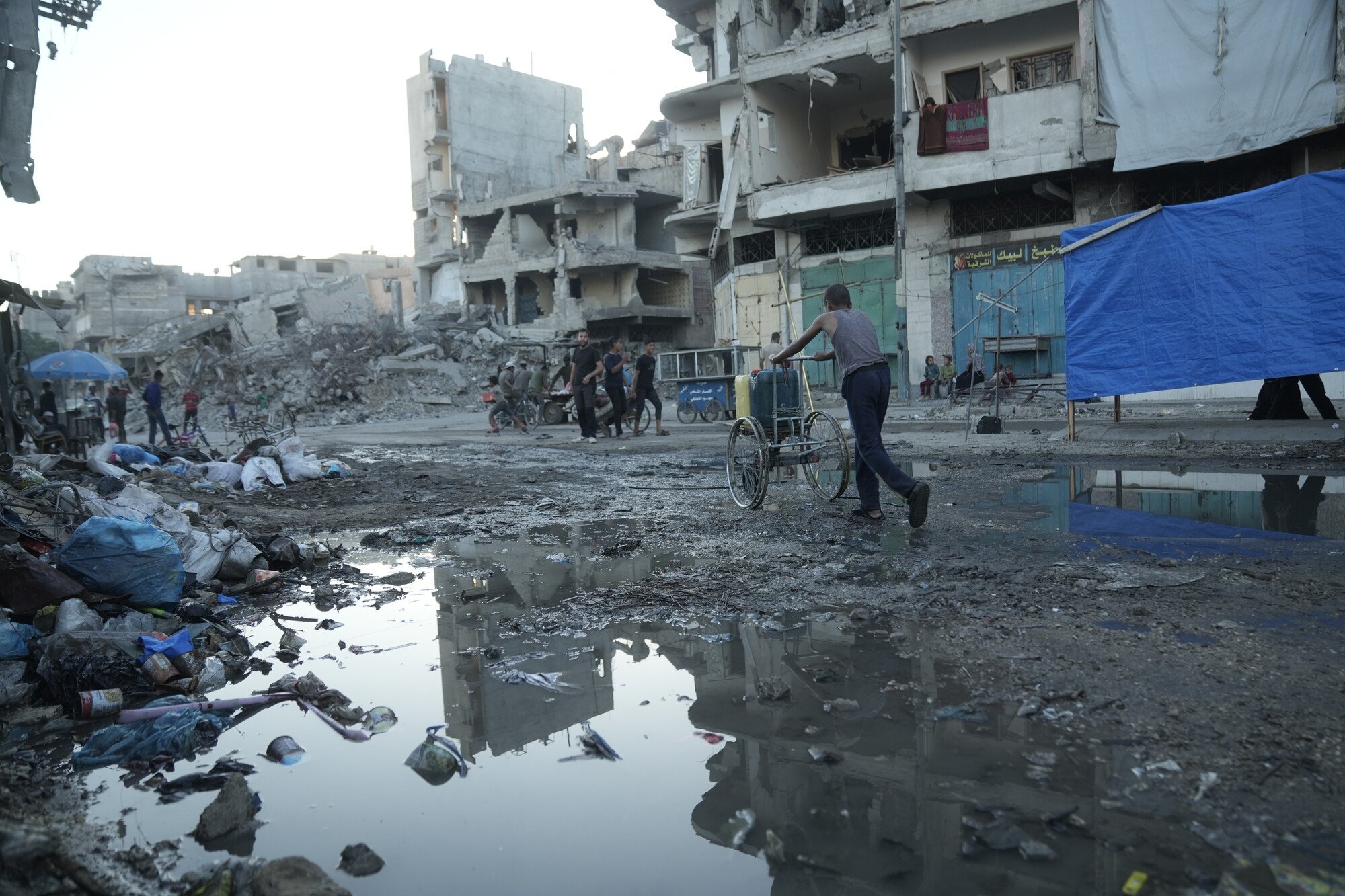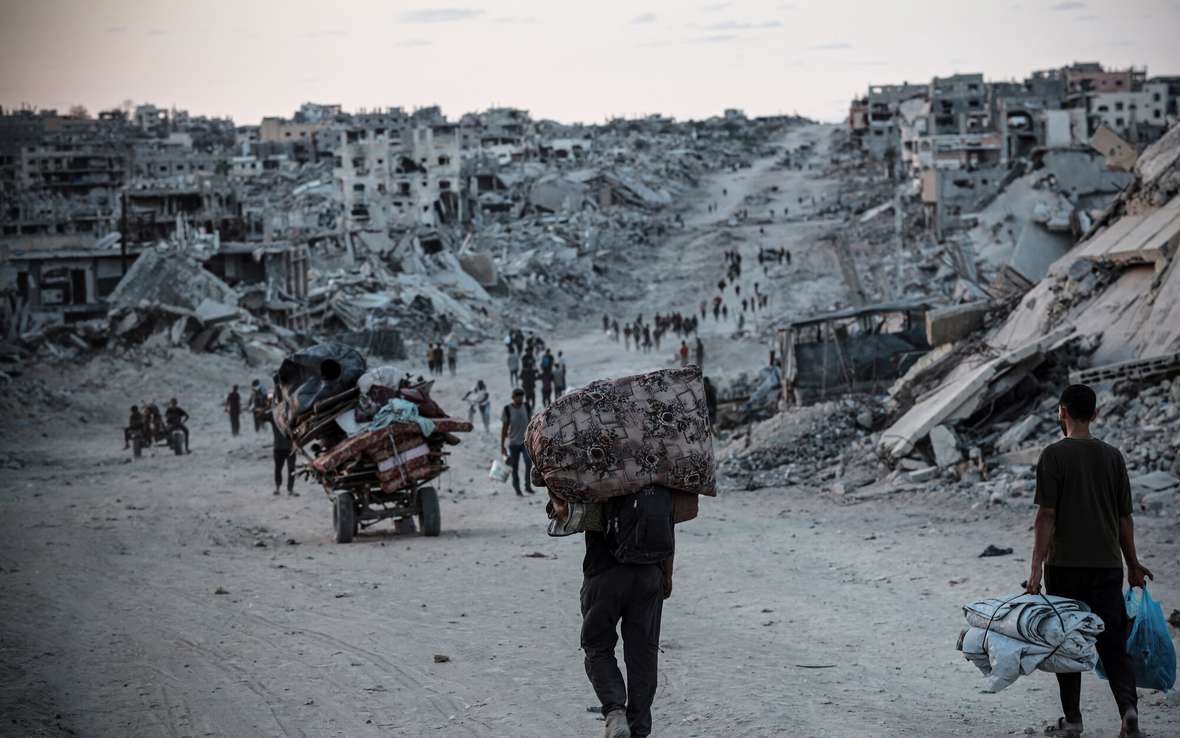The situation in Gaza and Israel is fast-moving and at times confusing. Here's what's happening, and what you can do to help.
Aid is now entering Gaza, but the volume is far below what is needed to meet urgent humanitarian needs. Oxfam is scaling up its work to assist partner organizations and people across Gaza as winter weather worsens conditions.
Since October 2023, Oxfam has been working with partners to deliver humanitarian assistance for people in Gaza, including clean water, hygiene items, and sanitation systems in areas hosting displaced people.
The fragile ceasefire in Gaza, strained by intermittent violence, is critical to save lives in the short term, and must also pave the way for a sustainable peace and genuine reconciliation.
This process cannot succeed without justice and accountability at its core for all Palestinians and Israelis, to prevent impunity and ensure the cycle of violence is not repeated.
How much food is getting into Gaza?
Some humanitarian supplies are entering Gaza, which is contributing to limited improvements in some communities. But the volume is still far below what is needed to meet urgent needs.
While limited food and other goods have become more available in some local markets, they remain largely unaffordable for many Palestinians. Presently, no child in Gaza is getting adequate food and nutrition.
Prior to the start of the war, 45 percent of all food in Gaza was produced locally, as were 100 percent of its vegetables. The people in Gaza relied on about 500 truckloads a day for aid and commercial goods.
The war in Gaza has decimated 70 percent of Gaza’s cropland. Farms, orchards, and greenhouses have been destroyed, and over the past two years, only a fraction of food that used to be delivered daily has been allowed through.
The latest global hunger report showed that 1.6 million people in Gaza are expected to face severe hunger through next April. In October and November, 100,000 people faced starvation.
In Gaza water has become a luxury item
Under Israeli blockade for the last 16 years, Gaza already had limited ability to manage its essential resources, particularly water.
During the conflict more than 2 million people were struggling to survive without access to clean water, which is a fundamental human right.
- The Israeli military campaign reduced the amount of water available in Gaza by 94 percent to less than five liters a day per person–equal to less than a single toilet flush.
- The destruction of water and electricity infrastructure—as well as restrictions on the entry of spare parts and fuel—saw water production drop by 84 percent in Gaza.
- Israeli forces have destroyed 70 percent of all sewage pumps and 100 percent of all wastewater treatment plants.
Oxfam's teams have reached over 800,000 people with water, sanitation, and hygiene support since Israel’s military campaign on Gaza began. Reconstruction of water and sanitation systems is a high priority that will help Gaza avoid outbreaks of water-borne diseases.

Following the announcement of the ceasefire in October 2025, Oxfam is sourcing materials within Gaza in order to scale up its work to assist partner organizations that are providing clean water, repairing water and sanitation systems (including building more than 600 latrines in southern Gaza), and helping people access crucial hygiene items like soap and menstrual products.
Are there any hospitals left in Gaza?
After the collapse of the temporary ceasefire in March 2025, the UN reported that 63 percent of the 35 hospitals in Gaza were at least partly functioning, but that “the destruction of critical medical infrastructure in Gaza … has severely affected the ability of the health system in Gaza to deliver life-saving services.”
By July, the percentage of partly functioning hospitals fell to only 47 percent, according to the UN.
Those most at risk are malnourished people and those living with disabilities, pregnant or new mothers, those recovering from injuries, and people with chronic illnesses or weakened immune systems.
How did we get to this?
On October 7th, 2023, Hamas and other armed Palestinian groups carried out appalling, brutal attacks on civilians in Israel. A total of 1,139 people were killed and 240 people were taken hostage.
Immediately following the attacks on October 7th, Israeli Defense Minister Yoav Gallant ordered a “complete siege” on Gaza, at the onset of a military campaign that has involved widespread airstrikes and ground incursions into Gaza, resulting in catastrophic loss of life and injuries to Palestinian civilians.
Between the 7th and 17th of October 2023, no food at all crossed into Gaza, forcing the population to use up what they had. Though the complete siege imposed at the start of the campaign was subsequently loosened somewhat, the Israeli government has tightly controlled and constrained humanitarian operations throughout the course of the war, systematically throttling the volume, range, and operational space of humanitarian delivery.
On the 13th, Israel ordered the evacuation of more than a million people from northern Gaza. The directive gave them just hours to pack up and leave their homes, which meant their food supplies and access to agricultural land were lost overnight. Currently around 70 percent of Gaza is under actively issued Israeli displacement orders, or an Israeli-declared buffer zone, or both.
After 15 months, a temporary ceasefire was announced on January 15th, 2025; it held for two months before fully collapsing. People in Gaza are again facing an overwhelming humanitarian crisis across all sectors following the Israeli government’s re-imposition of a full blockade and resumption of intensive air and artillery strikes and military campaign in March.
The famine classification (by the Integrated Food Security Phase Classification) issued in August 2025 confirms what Oxfam staff and the entire humanitarian community in Gaza have been warning for months: Israel’s continued campaign of bombing and blocking aid has brought widespread deadly starvation to Palestinian families in Gaza.
The Israeli military has occupied Palestinian territory, which includes Gaza, the West Bank, and East Jerusalem, for 58 years. Israel has also imposed a blockade on Gaza since 2007, which has devastated Gaza's economy, left most people unable to leave, restricted them from essential services such as healthcare, and cut Palestinians off from each other.
Over the past two years of conflict in Gaza, more than 65,000 Palestinians have been killed by Israel's destructive military campaign.
What is Oxfam doing in Gaza?
In collaboration with 20 partner organizations in Gaza, Oxfam has reached more than 1.2 million people with lifesaving assistance since October 2023.
Immediately following the ceasefire in October 2025, Oxfam is scaling up its work in Gaza to assist partner organizations, people displaced by the conflict, and those on the move and choosing to return to their homes. With your support, Oxfam plans to reach 500,000 people as soon as we’re able. Over the next three months, we will be focusing on a range of emergency interventions including:
- Clean water for displaced people
- Food parcels
- Access to hygiene items, including menstrual products
- Rehabilitation of water and sanitation systems and wells
- Solid waste management
- Training and inputs for home gardens to help people grow vegetables
- Support for women’s rights organizations helping survivors of gender-based violence, and providing other essential services for women and girls affected by the conflict.

Oxfam partners include the Palestinian Medical Relief Society, Juzoor for Health and Social Development, the Economic and Social Development Center of Palestine, the Palestinian Agriculture and Relief Commission, and the Palestinian Development Association. They are providing psychological first aid training and counseling to youth, as well as supplies like food parcels, clothes, blankets, menstrual products, and toothpaste. This assistance is reaching those living in makeshift shelters in the northern and southern region of the Gaza Strip.
Oxfam has worked in the Occupied Palestinian Territory and Israel since the 1950s. We have supported communities in Gaza, West Bank and East Jerusalem (where the Government of Israel maintains full military and civil control) to tackle the root causes of conflict, build resilience to sudden shocks, and protect their rights.
What needs to happen now?
- Demand lifesaving aid for Gaza
- Israel should allow full and unrestricted humanitarian access to Gaza
The need for peace
A ceasefire must also be a precursor to creating a lasting and just peace for all Palestinians and Israelis. To break the cycle of violence, the international community must tackle the root causes of injustice and violence that are being perpetrated under the Israeli occupation and blockade of Gaza.
Military force cannot resolve this decades-long conflict and the continuing violence is not bringing us any closer to the peace that Palestinians and Israelis need and deserve.
The U.S. and others must now do all in their power to push for the ceasefire to be fully implemented with increased access and improved conditions for a surge of aid and other vital goods. The deal must be just the first step towards a path to sustainable peace and security for all Palestinians and Israelis. We cannot have this fragile progress undermined by policies that do not respect the lives, dignity and future of Israelis and Palestinians equally.
Find out more
- For the most reliable updates on the situation, visit the UN OCHA website.
- Donate to our Gaza Emergency Appeal.
- How to help Gaza
